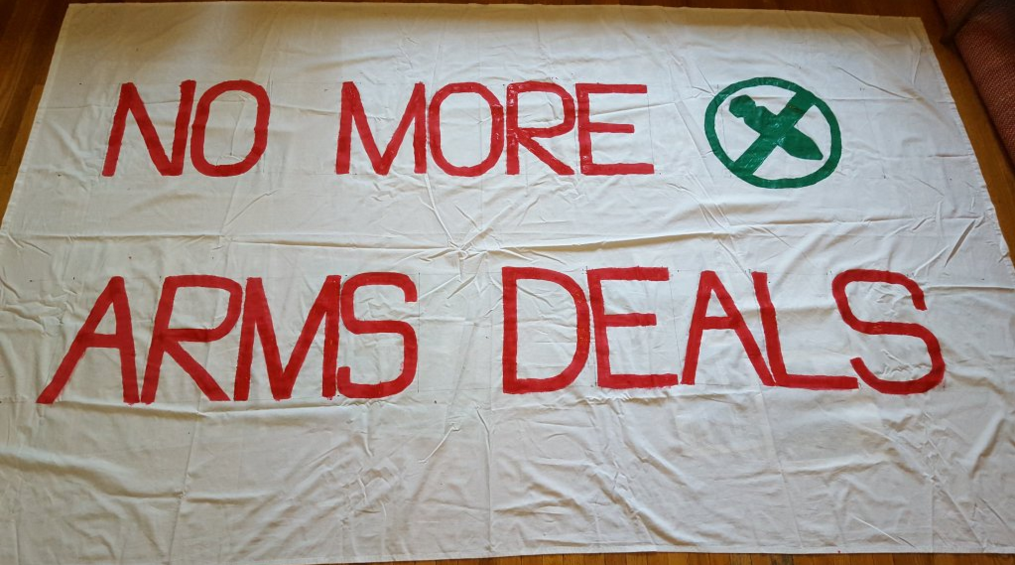Like this article? rabble is reader-supported journalism. Chip in to keep stories like these coming.
Ottawa-based group Homes Not Bombs held two actions on May 24 and May 25 to protest the 2016 Canadian Association of Defence and Security Industries (CANSEC) military trade show.
On May 24, the group staged a War Criminals Welcoming Walk, “which featured a character by the name of General Chaos, who went to the different hotels that were hosting guests of the CANSEC weapons fair,” Matthew Behrens, coordinator of Homes Not Bombs, told rabble in a telephone interview.
“A dogged group of peace activists and people who have lived in and worked in a war zone gave speeches at each hotel to enlighten the CANSEC guests about why people might be pissed off about the weapons fair,” Behrens explained.
On May 25 from approximately 10:00 a.m. to 12:00 p.m., Homes Not Bombs members occupied Minister of Foreign Affairs Stéphane Dion’s office “because they were concerned that Dion was violating Canada’s own war crimes legislation with respect to the Saudi arms deal,” Behrens told rabble.
Three occupiers were arrested when they refused the leave the building, including two senior citizens. The occupiers were released with charges of trespassing and engaging in prohibited activities.
From 7:00 a.m. to 1:00 p.m., Homes Not Bombs also staged a vigil at the entrance to the CANSEC fair. “We brought the faces of war to the people who profit from war,” Behrens said. “We had large, four foot by four foot faces of children and families from Iraq, Gaza, and other warzones to remind people that their business is not an abstraction.”
Homes Not Bombs organized the actions to encourage more engagement in nonviolent civil disobedience against Canada’s participation in the global arms trade. “[Homes Not Bombs organizers] feel it is our responsibility as members of a population that ultimately benefits from these wars to say: not in our name, no murder in our name, no repression in our name,” said Behrens.
“Freedom to protest is inherent in any democratic nation and a fundamental right in Canada,” said CADSI President Christyn Cianfarani of the demonstrations.
Solidarity actions in Montreal
Montreal-based Collectif échec à la guerre, an anti-war coalition, organized a solidarity demonstration in front of the Guy Favreau Complex, a federal government building located at 200 Boulevard Réné-Lévesque.
At the Montreal protest 50 to 60 demonstrators passed out leaflets to passersby, listened to performances by the Raging Grannies and heard speeches by the President of the Quebec Federation of Women, a former Canadian military member who fought in Afghanistan and Bosnia, and a spokesperson for BDS Quebec.
Raymond Legault, a spokesperson for Collectif échec à la guerre, told rabble in a phone interview that the Montreal protest was organized “to oppose the Canadian participation in the global arms trade,” as well as the “governmental decisions that favour the arms trade and benefit the large corporations” participating in and benefitting from CANSEC.
“One local target of the protest was Montreal company CAE, which we think is a major actor in the North American military-industrial complex,” Legault noted. CAE produces flight simulators for training pilots, both military and civilian, as well as for training drone pilots.
“This company does about 50 per cent of its business in the military sector and 90 per cent of its business are exports,” Legault continued.
A McGill student involved with Demilitarize McGill at the Montreal protest told rabble that “it was great to see a lot of folks with different perspectives on why CANSEC is a bad thing and why Canada shouldn’t be supporting it, but I was there with the intention of pushing folks towards participating more in direct action against the sites in Montreal that are supporting the arms trade.”
The student, who asked to remain anonymous, described how according to research conducted by Demilitarize McGill, a McGill lab, the Computational Fluid Dynamics (CFD) laboratory in the Department of Mechanical Engineering works on computer software that CAE uses. The lab is funded by CAE, as well as Bombardier and Bell Helicpoter Textron.
“We see [the CFD lab] as one location of pretty clear complicity between McGill and the occupation of Palestine, U.S. imperialism, and the global arms trade,” the student explained.
CANSEC 2016 comprises over 700 booths and 331 exhibitors of military technology and weapons, and will draw over 11,000 participants, including over 130 Canadian decision makers, 76 foreign decision makers, and six Canadian cabinet ministers.
Sophia Reuss is a Montreal-based writer, editor, and is a recent graduate of McGill University. She’s interested in how online media and journalism facilitate public accessibility and conversation. Sophia also writes and edits for the Alternatives International Journal.
Photo: twitter/@KevinShimmin



